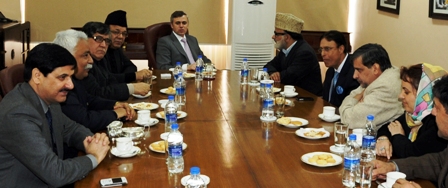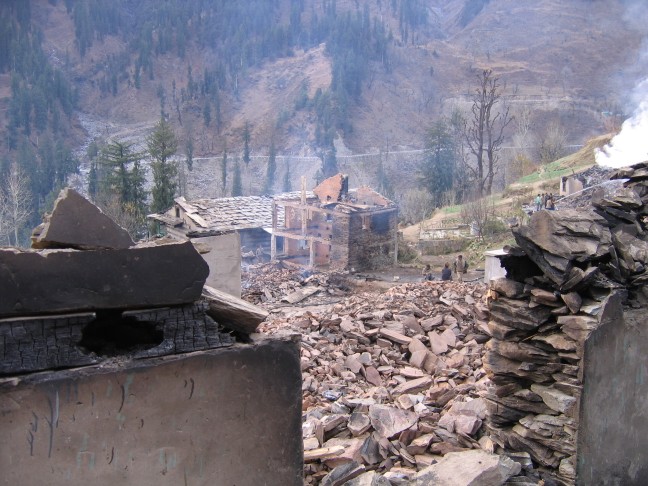Early this week Jammu and Kashmir Chief Minister Omar Abdullah carried out massive reshuffle in his council of ministers and also the ruling party National Conference, of which he is the Working President.
Though an exercise in interest of political expediency in view of next year’s elections the reshuffle in the cabinet is a first welcome step in giving voices to the margins. The move has significantly challenged the urban power centres to share the highest decision making table with peripheries of all three regions in Jammu and Kashmir.
However, the revamp in the ruling National Conference was essentially an honourable exit of few persons from ministry and other positions to make way for some long neglected people and areas
Regional dynamics of the cabinet
The people of Pir Panjal –Rajouri and Poonch districts –and Chenab Valley –the erstwhile Doda district –regions in Jammu Province had a genuine feeling of neglect and political discrimination ever since the formation of present government of National Conference and the Congress in January 2009.
Eleven legislators with the ruling coalition from 13-segmented culturally unique two sub-regions and not a single member in the Cabinet made everyone in these areas feel humiliated as power concentrated in urban Jammu. In the new scheme of things, the Chenab Valley has got three Ministers –one in Cabinet and two Ministers of State with independent charge.
What is still of greater significance is the allocation of departments. Chenab Valley accounts for maximum number of road accidents in the State. Roads and Buildings department going to Abdul Majid Wani of Doda would be of help in giving a localised attention. Sajjad Kichloo of Kishtwar has become first Minister for Industries and Commerce since 1977 who is not from Jammu district or its immediate periphery.
Failure will be entirely his if he is not able to get some industries to the hilly areas. Rajouri and Poonch expected more representation in the ministry but allocation of Health Department to Shabir Ahmed Khan in his upgraded position as MoS with Independent Charge is a significant consolation for the region.
Towards the north of Kashmir Valley, Nazir Gurezi’s and Mir Saifullah’s coming into Cabinet, along with Choudhary Ramzan and Akbar Lone is, though, primarily an NC strategy to check the Peoples Democratic Party but representation to these areas was long overdue.
It is indeed of much greater significance that Zanskar in Kargil district has got a Minister, the first in many decades. In Ladakh region, on the margins of cultural and administrative headquarters of Leh and Kargil, the remote and largely inaccessible Nubra and Zanskar have always rued their exclusion.
Nubra though got a Minister of State in 1996 through 2002 but Zanskar has always remained out of focus. Feroze Khan is now a Minister of State. His department of independent charge, Science and Technology is, though, of significant help to the Zanskar but a wide array of other departments he shares with senior in Cabinet would help him address some of the pestering issues in his fully tribal constituency.
In the reshuffle, the vesting in Revenue department in Ajaz Ahmed, a Minister with immaculately clean image in the public estimation, also marks a significant overhaul and so is the case with Public Health Engineering. Khan has actually graduated to this important department in a step by step upgrade since he contested but lost first election in 1996. This gradual rise with experience should be an important benchmark, particularly seen in context of statements of resentment coming from three-time consecutive winning legislators who question appointment of first timers into cabinet.
NC needs real revamp
Along with the cabinet reshuffle a big noise is made out about major thrust on revamp in National Conference. The other ruling coalition partner, the Congress, cares very little about the organisational politics when it comes to Jammu and Kashmir where it works either on personality cults or adhocism.
It matters much in National Conference for being the State’s premier political party. The reshuffle in the cabinet and revamp in the lead ruling party is being linked with assembly elections due late next year and cue is also being attributed to the Kamraj plan of textbook importance. However, looking at the kind of changes that have been effected there is hardly anything to suggest that.
The so called overhaul in National Conference is purely and essentially an honourable exit of few persons from ministry and other positions to make way for some long neglected people and areas. On the day of ministry reshuffle the NC made twelve appointments to the organisation.
It, therefore, comes with no surprise that nine of the twelve new office bearers were made to resign from the government the same day –six as ministers, two as chairpersons of the boards and one as adviser to the CM. Far from a revamp of the order to put party actually in election gear the changes convey that these are the only cogs in NC’s wheels –dividing time between party and the government.
Take, for example, Nasir Aslam Wani and Devinder Singh Rana have performed extremely well as most dependable political and administrative support to Omar Abdullah, the Chief Minister.
Now they are provincial president to Omar Abdullah, the working president of NC. Analysis of public perception conveys that taking these men to party causes a void in CM’s inner line of team in the secretariat and holding them back means vice versa.
There is yet another example: five persons put in top organisational hierarchy at State level –a senior vice president and four as vice presidents –are far lesser in influence and reach than the two who are provincial presidents.
What is of immense importance to NC is to groom a class of leaders who have their personality, influence and vision transcending beyond their assembly constituencies. The new team put in place to prepare party for the elections is the one in which every member, except Rattan Lal Gupta, has the challenge of securing his own constituency.
NC is perhaps the only party in the State with a mix of rich experience and firebrand young energies, a cadre spread in all nooks and corners of the state, close to a million registered members and, above all, affiliations based on traditional ideological basis.
Putting organisation in election mode is a temporary measure altogether, the NC needs to do a lot more on an actual revamp to make it a party of the next generation that builds upon the clout of the old guard.
Zafar Choudhary is a senior journalist and Asia Society Fellow on India-Pakistan Leadership Forum.
He can be reached at [email protected]




